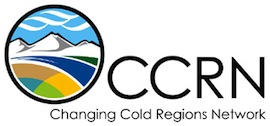Workshop on "Extreme Weather and Hydrology - Lessons Learned from the Western Canadian Floods of 2013 and Others"
(Grande Rockies Resort, Canmore, AB, February 11-12, 2014)
A two-day workshop, attended by nearly 50 people representing 12 different Canadian and U.S. agencies in addition to the CCRN partner universities, was held 11-12 February 2014 in Canmore, AB to evaluate, analyze and synthesize a case study of extreme weather and hydrology with a focus on the Western Canada Floods of 2013. The Workshop first compiled a hydrometeorological diagnosis of the June 2013 floods in Western Canada and then related this to broader atmospheric and hydrological dynamics and change and to extreme hydrometeorological events in North America. It synthesized descriptions of hydrometeorological processes and statistical properties, hydrological and atmospheric modelling and water management implications as they relate to the Western Canadian Flood of 2013 and related events.
A public forum also took place on the evening of 12 February at the Canmore Collegiate High School, including a talk by Dr. Roy Rasmussen of the US National Center for Atmospheric Research on the September 2013 Colorado flooding event, followed by an expert panel open discussion.
Presentations
- Howard Wheater, Univ Saskatchewan; Introductory Remarks on CCRN
- John Pomeroy, Univ Saskatchewan; Introductory Remarks on the Extreme Events of 2013 and the Objectives for the Workshop
- Ron Stewart, Univ. Manitoba; Atmospheric Overview of the June 2013 Flooding Event
- John Pomeroy, Univ. Saskatchewan; Overview of the Hydrometeorology of the Canadian Rockies Flood of June 2013
- Colleen Walford, Alberta Environment & Sustainable Res. Dev.; Flood Forecasting Methodology in Alberta
- Bill Duncan, Water Security Agency of Saskatchewan; June 2013 Rainstorm Runoff Event in Saskatchewan River Basin: Saskatchewan Perspective
- Sean Carey, McMaster Univ.; The Flood in the Elk River Valley, BC
- Masaki Hayashi, Univ. Calgary; Potential Roles of Groundwater in Mitigating or Exacerbating the Impacts of Floods
- Don Cline, Office of Hydrology, NWS, NOAA; Extreme Hydrology Prediction in the United States
- Julie Thériault, UQAM; The June 2013 Alberta Flooding Event: Climatology, Synoptic Conditions and Precipitation Fields
- Yvonne Martin, Univ. Calgary; Debris Flow Activity in Kananaskis Country, Alberta: The Link for Sediment Transfer Between Hillslopes and Rivers
- Logan Fang, Univ. Saskatchewan; CRHM Modelling of Mountain Hydrological Processes in Marmot Creek during the Flood
- Bruce Davison, Environment Canada; Prediction and Reanalysis of the Flood and High Precipitation Event
- Yangping Li, Univ. Saskatchewan; WRF Model Simulation of the June 2013 Alberta Flooding Event
- Andy Esarte, Town of Canmore; Canmore and the Flood – Anticipation, Response, Impact on a Municipal Level
- Danny Marks, USDA, ARS; The Sensitivity of Mountain Snowcovers to Temperature, Humidity, and Phase Change in a Warming Climate
- Paul Whitfield, Unv. Saskatchewan; Changes to Autumnal Streamflow Features in the Rocky Mountains of North America
- Al Pietroniro, Environment Canada; Measuring the Flood from BC to Manitoba – Challenges and Opportunities
- Katrina Bennett, Univ. Alaska; Extreme Streamflow in Interior Alaska River Basins
- Ric Janowicz, Yukon Dept of Environment; 2013 Extensive Yukon Ice Jam and Freshet Flooding
- Roy Rasmussen, National Center for Atmospheric Research; High Resolution Simulation of an Extreme Snow and Rain Event in Colorado in both a Current and Future Climate
- Public Talk: Roy Rasmussen, National Center for Atmospheric Research; The Colorado Great Front Range Flood of 2013 – Lessons for Alberta
